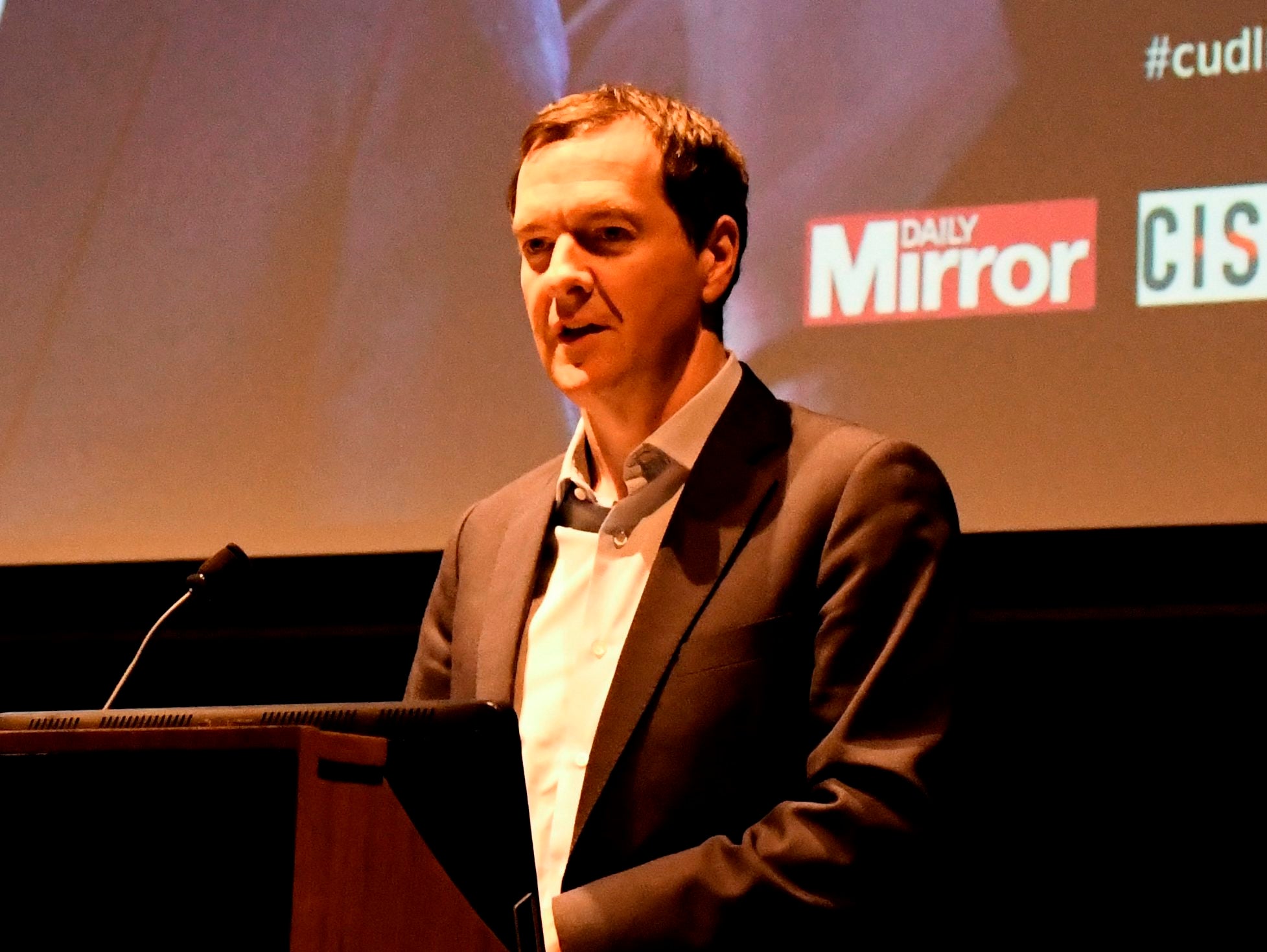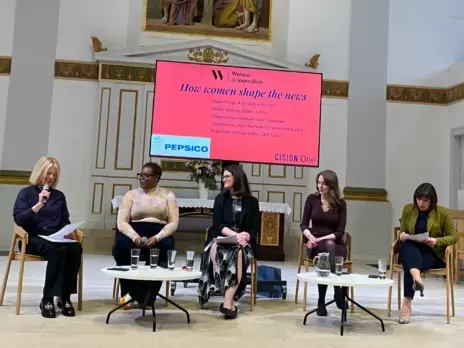
Evening Standard editor and former Chancellor of the Exchequer George Osborne used this year’s Hugh Cudlipp Lecture to say the influence of the press in Britain’s decision to leave the European Union has been “overstated”.
The ex-Tory MP said that despite “adulatory press” for Theresa May from most national newspapers during the 2017 general election campaign, in contrast to “consistently negative coverage” for Labour leader Jeremy Corbyn, May still lost her parliamentary majority when the vote came.
“Fleet Street didn’t determine the outcome. The public did,” he said.
Osborne, who campaigned for Remain, added: “Even with Brexit, where a consistent and negative campaign by prominent newspapers provided a barrage against those of us arguing to stay in the EU, I think the press’s influence was overstated.”
George Osborne on Brexit: ‘Newspapers don’t determine the outcome of elections’
Delivering the annual lecture at Regent’s University in London last night, Osborne went on: “I am pretty certain that newspapers today don’t determine the outcome of elections or referendums.
“But it would be a great mistake to think that, as a result, they don’t matter to our politics – let alone our cultural, commercial and sporting life.
“Newspapers may not decide elections, but they play a key role in leading and structuring the public conversation here. A role that these days it has become fashionable to underestimate.”
Osborne, who has now spent two years in the editor’s chair at the Standard, overseeing a revamp of the title last year, also used his platform to weigh in on a number of different issues affecting the UK media.
He said accepting public money to sustain newspapers, as some have suggested in the face of failing traditional revenue models, “smells of defeat”, stating that newspapers are “not charities”.
He said the British media had made a “fateful decision” in the previous decade to offer their content for free online “in the hope that digital advertising would pay for it.”
“But all online journalism has struggled to attract the advertising revenues that their print cousins once generated. Just look at the sad news about jobs losses at Buzzfeed and Huffpost.
‘Newspapers are businesses not charities’
“Digital subscriptions work for smaller readerships of broadsheets like the FT and the Times, and I think they and others have done a good job with their products. I pay for both on my mobile phone.”
But, he added: “To be frank, the social challenge is not getting high-quality journalism into the hands of a relatively small number of middle-class professionals like me. We’ll always be prepared to pay for news and comment. It’s the mass market where the problem lies.
“That’s where print newspapers have seen the most precipitous declines, and where online paid-for subscriptions will never be large enough to replace lost income. We continue the push online.”
Osborne said the Standard’s digital presence had grown to 100m page impressions and 39m unique visitors in January alone. In print it reaches 1m people, offering a free evening newspaper every weekday.
“But still we need to do more. Events. Sponsorship. Working with partners on projects to improve the future of London,” he said.
“I am unapologetic about all of this. If you want quality journalism, someone has to pay for it. Newspapers are businesses not charities. They always have been.
“Pick up the front page of a 19th century copy of the Times and the whole front page was full of ads, not unlike when we wrap an ad round our paper today.
“A sustainable future cannot rely on begging for contributions. Nor would we ever want them funded by the taxpayer, like the BBC. We need to find long-term sources of commercial income.”
Last year the Standard was forced to defend its editorial integrity after claims emerged that it had sold “favourable” news coverage to advertisers including Google and Uber.
Fake news offers ‘glimmer of hope’
In his speech last night, organised by the London Press Club, Osborne said the scandal of “fake news” presented a “glimmer of hope” for the future of newspapers. “What encourages me is that people care,” he said.
“They care enough that their political leaders are hauling the big social media companies before Congress and the Commons and the European Parliament and demanding action to stop it happening again. So too are the big advertisers who generate their revenues.
“Reputable companies can’t afford to see their products placed alongside foreign subversion and deliberate disinformation. We should keep the pressure up on their boards and shareholders.
“Because the answer to all of this is to turn to an organisation that employs properly-trained journalists, thorough sub-editing and legally-accountable editors.
“In other words, you might receive your news via Facebook, but it’s supplied by a newspaper or broadcaster you can trust.
“When a revolution comes, it feels like all that is old is swept away and only the new has value. And then, as excesses that come with any revolution repel, and the novelty wears off, people start to remember the value of some of the things they discarded.
“I think that is what is happening now.”
‘Accepting public money smells of defeat’
Osborne also took aim at the Government’s Cairncross Review into the future of sustainable high-quality journalism in the digital age, which published its findings last month.
The report included nine proposals to save the news industry, including setting up an Institute for Public Interest News, tax reliefs for publishers and expanding the BBC’s local democracy reporter scheme, which has employed nearly 140 journalists to fill gaps in council coverage.
Osborne said that while it offered some “useful recommendations about strengthening the hands of publishers against online platforms”, the rest of the report “only scratches at the surface”.
“Extending the current local democracy scheme to hire a few more local reporters is fine – we have some at the Standard doing a great job – but it isn’t going to replace the shrinking incomes and newsrooms of papers.
“Abolishing VAT on digital products may help a few high-end subscription apps, but the Finance Minister in me thinks it would be very difficult for it to end up not being a big tax cut for big tech.
“Establishing an institute to funnel public funds into what they call ‘public interest news’ feels like a Pandora’s Box that no one will want to open.”
He added: “Once the state – or an arm of – starts trying to make the decisions about what should be printed that is in the public interest as opposed to what interests the public, trouble is coming.
“Ask yourself: could public funds have ever been used to buy stolen property, like the computer disks that had the details of MPs expenses on them? That was one of the biggest newspaper scoops of my lifetime.
“Accepting public money also smells of defeat. Using taxpayer subsidies to support what has until now been a commercial activity has never been a route to long term sustainability.
“Curbing the activities of the BBC is what lots of newspapers still cling to – and it’s true their website looks more and more like an online newspaper, with film reviews and cooking recipes and the like.
“But fundamentally our national broadcaster is part of the solution to providing quality journalism to the British public, not part of the problem.
“Cannibalising the BBC to sustain Fleet Street feels like a solution from the past. Today neither are strong enough.
“We don’t want to end competition in the media industry – it’s ruthless competition that drove so much of the innovation we’ve seen, from Murdoch’s relaunched Sun newspaper 50 years ago to the FT app and Standard online of today.
“Nor do we want newspapers to become charities or dependents on public subsidy. What we want instead is to create fair competition, and break up the monopolies that prevent that.”
‘Let people own their data’
Osborne proposed a new “big idea”, which is to “let people own their data”.
“The deal is this: we all get to use the internet for free, and do all sorts of things – from playing games to watching videos to looking up things on Wikipedia – that a previous generation would have paid for.”
He added: “It’s very valuable information. Indeed the world’s most expensive companies have been created on the back of it. For all that data helps them direct the right advertisers to you – and then take a big cut.
“And they don’t share the data with the producers of the content, like newspapers, that is drawing people to their platforms. But the data is generated by you – and you’re handing it over for free. And we’re providing the content, and we’re not told who is using it and how.”
Osborne also said he had not met the new Saudi investor who had taken a large stake in its parent company Lebedev Holdings and said the editorial independence of the newspaper was not affected.
The Cudlipp Lecture is named after the Mirror’s former editorial director.
- Isabel Van Burgen took home the Hugh Cudlipp Student Journalism Award last night, winning £1,000. She won for her work going undercover at an abortion clinic in Northern Ireland, revealing the misinformation given to women. It made the front page of the Times in Ireland.
Picture: London Press Club
Email pged@pressgazette.co.uk to point out mistakes, provide story tips or send in a letter for publication on our "Letters Page" blog






